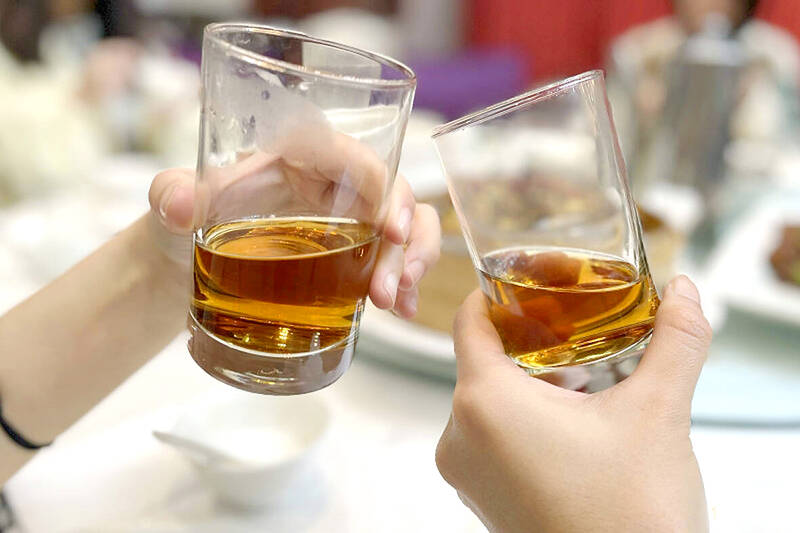Taiwan should raise the legal drinking age to 21 to mitigate the health risks associated with alcohol, medical experts told an academic conference yesterday.
National Taiwan University professor emeritus of medicine Wang Cheng-yi (王正一) said alcohol consumption is linked to more than 200 diseases, including cirrhosis, liver cancer, stomach cancer and bowel cancer.
Drinking is also correlated to increased risks of traffic incidents and mental illness, which take a toll on society, he said.

Photo: Taipei Times
A survey conducted by the Ministry of Health and Welfare in 2021 revealed that 14.1 percent of junior high-school students and 30.6 percent of senior high-school students had recently consumed alcohol, he said.
The same survey conducted in 2022 showed that 38.5 percent of college students had recently consumed alcohol, including 14.4 percent who drank an unhealthy amount, Wang said.
Starting drinking earlier in life is linked to increased risks of developing alcohol-related health problems later, he said.
Citing medical research in the US, Wang said raising the legal drinking age to 21 is correlated with lower rates of alcohol consumption and drunk driving-related traffic incidents, he said.
The Japanese government’s ban on drinking by people younger than 20 years old achieved similar results, Wang said, adding that Japan had retained the legal drinking age despite later reducing the age of majority to 18.
Taiwan’s drinking age of 18 could encourage adolescents one or two years younger than the legal limit to consume alcohol, while regulations do not stipulate measures for the prevention of underage drinking, he said.
Alcohol-related diseases cost the National Health Insurance NT$5.3 billion (US$161.01 million) annually, while all alcohol-related health problems, including those caused as a result of drunk driving, cost it NT$53 billion, National Health Insurance Administration Deputy Director-General Chen Lian-yu (陳亮妤) said.
Studies conducted by WHO and the US government suggest that every US$1 spent on preventing alcohol use saves US$7 by reducing illnesses, domestic violence and traffic incidents, she said.
Taiwan has 138 alcohol addiction treatment clinics, she said, adding that people who wish to seek help with alcohol addiction can obtain up to NT$40,000 in medical subsidies per year.
Ninety percent of people who undergo treatment reported cessation or reduction of alcohol consumption, she said.
On Friday, US Surgeon General Vivek Murthy said alcohol sold in the US should carry labels that clearly state the substance is a leading cause of cancer.
Alcohol consumption is to blame for nearly 1 million preventable cancer cases in the US over the past decade, he said, adding that about 20,000 people die every year from those alcohol-related cancer cases.
Additional reporting by AP

Travel agencies in Taiwan are working to secure alternative flights for travelers bound for New Zealand for the Lunar New Year holiday, as Air New Zealand workers are set to strike next week. The airline said that it has confirmed that the planned industrial action by its international wide-body cabin crew would go ahead on Thursday and Friday next week. While the Auckland-based carrier pledged to take reasonable measures to mitigate the impact of the workers’ strike, an Air New Zealand flight arriving at Taipei from Auckland on Thursday and another flight departing from Taipei for Auckland on Saturday would have to

The Taipei City Government yesterday confirmed that it has negotiated a royalties of NT$12.2 billion (US$380 million) with artificial intelligence (AI) chip giant Nvidia Corp, with the earliest possible signing date set for Wednesday next week. The city has been preparing for Nvidia to build its Taiwan headquarters in Beitou-Shilin Technology Park since last year, and the project has now entered its final stage before the contract is signed. Taipei Mayor Chiang Wan-an (蔣萬安) said the city government has completed the royalty price negotiations and would now push through the remaining procedures to sign the contract before

Taipei Zoo welcomes the Lunar New Year this year through its efforts to protect an endangered species of horse native to central Asia that was once fully extinct outside of captivity. The festival ushering in the Year of the Horse would draw attention to the zoo’s four specimens of Przewalski’s horse, named for a Russian geographer who first encountered them in the late 19th century across the steppes of western Mongolia. “Visitors will look at the horses and think that since this is the Year of the Horse: ‘I want to get to know horses,’” said zookeeper Chen Yun-chieh, who has been

The Ministry of Foreign Affairs on Thursday said the name of the Taiwanese Representative Office in Lithuania was agreed by both sides, after Lithuania’s prime minister described a 2021 decision to let Taiwan set up a de facto embassy in Vilnius as a “mistake.” Lithuanian Prime Minister Inga Ruginiene, who entered office in September last year, told the Baltic News Service on Tuesday that Lithuania had begun taking “small first steps” aimed at restoring ties with Beijing. The ministry in a statement said that Taiwan and Lithuania are important partners that share the values of freedom and democracy. Since the establishment of the